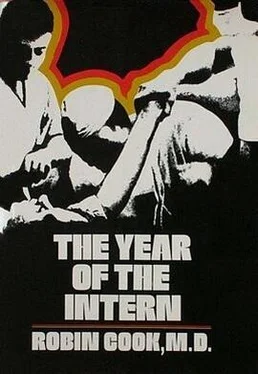I nodded my head to Mrs. Tang, an elderly Chinese lady with a cancer growing inside her mouth. She couldn’t talk, so we just nodded. The cancer was so big that it had dissolved some teeth and the bone of the jaw on the left side, becoming finally an uncontrollable, fungating mass that occasionally broke through the side of her throat. She was like many older Chinese people who thought of a hospital only as a place of death and would not come to us until the very end. There was little we could do for Mrs. Tang but try some X-ray therapy. The cancer got bigger every day, and somehow Mrs. Tang every day seemed less real — perhaps because she couldn’t talk, or maybe because she was so resigned.
There were others: a lymph-node biopsy, a breast biopsy, two hernia repairs. I greeted each of them, passing from bed to bed, using their names — I knew them all by now. I even knew the families of many of the patients who had been with us quite a while. The other intern and a handful of residents arrived, including the chief resident, and morning rounds began. This was a rapid affair; we probably looked like a bunch of myna birds, moving awkwardly and quickly, almost stepping on one another in our haste, as we went from bed to bed. The haste was necessary since we now had only half an hour until the first scheduled operation. No articles were discussed; we didn’t do much more than just count heads to make sure everybody was still there. Gastrectomy, five days postop, going smoothly. Hernia, three days postop, probable discharge. Varicose veins, three days postop, also probable discharge. Gastric ulcer, X rays complete, scheduled for surgery. Did the X ray show the ulcer? Yes. Good.
In the next ward, we stood in the middle and twirled slowly on our heels. Mass lesion, mediastinum, aortogram pending. I ran through a staccato capsule description on each of my patients. The other intern did the same. There were four such wards, and we finished the last case in the fourth ward exactly seventeen minutes after starting.
“Peters, you do another cutdown on Potts while we go to the ICU and pediatrics.” The little troop disappeared around the corner, and I turned toward Marsha Potts’s room, confused and irritated, silently protesting. She wasn’t even my patient. I knew I had been chosen because I didn’t have any surgery until eight, instead of the usual seven-thirty, but even so I didn’t want to get involved with her again, after fooling around with that venous pressure setup the night before. Moreover, a cutdown could be tricky. I hadn’t done many of them. But mainly it was just so damn unpleasant in there. Still, Marsha Potts needed a cut-down because she needed intravenous fluid and food; with no more superficial veins that we could use for her IV, we had to cut down on a deeper vein.
As I entered that room, the cheerful morning bustle faded away. Even the bird sounds became inaudible to me, although of course they were still there. The smell was almost overpowering, so pungent and revolting it made the air seem heavy. It was the hot smell of rotting tissue mixed with the sweet, syrupy smell of scented talcum powder being used in a vain attempt to counteract the stench. The talcum powder only made it worse for me. Trying not to look at the poor woman’s face, I put on three surgical masks to fend off the smell, but the layers made it hard to breathe and my diaphragm struggled to draw in the thick air. I didn’t want to touch too many things in there. Death seemed spread on everything, almost contagious.
I pulled up the sheet from the bottom and bared her right foot. There were open ulcerations on the underside of her leg and the back of her heel. In fact there were sores all over her body, wherever it touched anything. After focusing a bright light on the medial aspect of her ankle, I pulled on the rubber gloves and opened the sterile cutdown tray.
The knife slipped through her skin with zero resistance. She was a little edematous on the foot, so that clear fluid rather than blood began to run from the wound. I was lucky to find the vein right away, and lucky I hadn’t accidentally cut it. After making a little nick in the wall of the vein, I slid the catheter easily inside it, first try, as drops of sweat appeared on my forehead from the heat of the bright light. Using silk, I tied the catheter in place and closed the little wound, watching the IV run freely. With my foot I pushed the tray away, snapped off the gloves, and walked rapidly out toward the sunlight and the birds.
Washing my hands, I felt a deep disgust with myself, and I didn’t know exactly why. She was a human being; I was supposed to help her. But the situation and her condition revolted me so much I had trouble accepting the responsibility. Where was my compassion; where was it going?
My first scrub was at eight, a cholecystectomy, or gall-bladder removal, with a private surgeon. My patient, Mrs. Takura, was scheduled for another operating room, to follow a ganglion removal; her operation should begin about nine, barring complications with the ganglion. Obviously I was going to be late for Mrs. Takura, but that was typical. The intern is a kind of pawn in the medical game; he is the first line of defense, sacrificed without remorse, disposable in the end, but needed, it seems, in the middle.
I pushed into the surgeons’ locker room and began to put on a pale green scrub suit. It was so cramped in there that everybody always got shoved around a little, in a good-natured way. In fact, the sense of equality and the recognition of everybody as a person made scrubbing there a pleasure. Back in med school, the students and house staff had dressed in a completely different area set off by doors and a separate stairway from the sanctum sanctorum of the attendings’ dressing quarters. It was almost as though a surgeon’s image would crumble if you saw him in nature’s state.
One med-school attending was so nasty that students actually shook while presenting their cases. A friend of mine — an excellent doctor, though inclined to stage fright — once had a complete lapse of memory at a bedside as he started to run through the facts in front of this attending. I knew he had the case down cold, but he could not get it out. “This woman presents an... uh... uh...” His face flushed and his pulses hammered at the sides of his neck. The attending could have eased the situation by suggesting that we come back to the case later, or even by giving a key word from the chart to bump the student’s memory chain. Not a chance. He had flown into a rage, shouting in wonderment that a person so stupid could have gotten into medical school and ordering the student out of his sight until he knew his patients well enough to present them. Not all the attendings were like that, but a significant number were, even, sometimes, the chief of the service. Naturally, after one of those episodes, rapport between student and patient was in bad repair when it came time to draw blood the following morning. As time goes on, many details of medical school will blend and merge into generality, but not, I think, the scenes of rant and frenzy staged by overbearing surgeons. Some of them behaved so violently that it almost seemed as if they hated medical students; and yet these men were our mentors, our teachers and models.
After the green gown, I put on canvas boots and plodded down the long surgical corridor. Some of the OK doors were closed, and as I passed their small windows I could glimpse Ku Klux Klan-like groups clustered in the center of the room. Other doors were open, some with cases going on, others empty with anticipation. Dozens of nurses moved about, highly organized and busy, many of them looking quite pretty — a high achievement for anyone in one of those shapeless suits, with her hair tucked under a scrub hat. Others, however, might have done well at defensive tackle for the New York Giants, playing without equipment and just scaring the opponent into submission. Everybody said good morning; it was a friendly place.
Читать дальше












